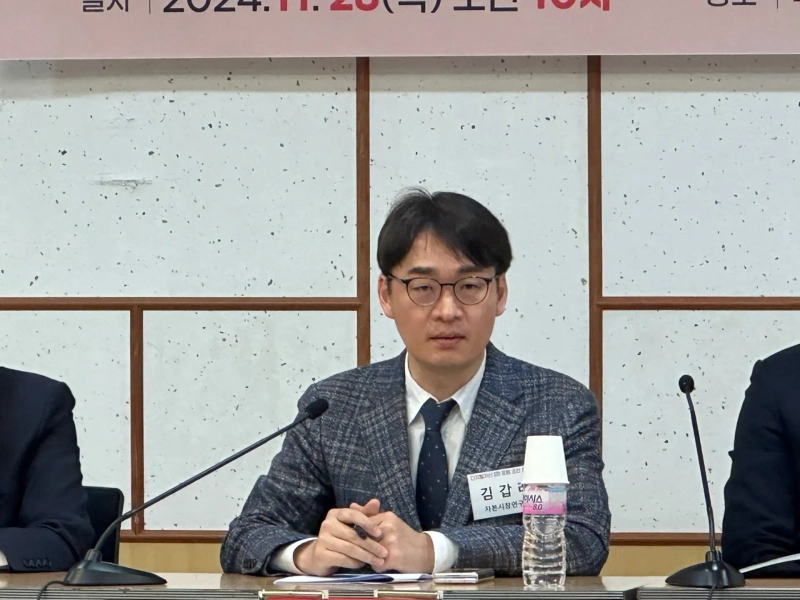PiCK 뉴스
김갑래 자본시장연구위원 "실패한 일본 가상자산 과세법 따라가야 하나…대안은 유예"
간단 요약
- 김갑래 자본시장연구원은 일본의 가상자산 과세법 실패를 벤치마킹하여 추가적인 논의가 필요하다고 전했다.
- 2025년부터 가상자산 과세가 시행될 예정이지만, 현재로서는 과세 유예가 유일한 대안이라고 밝혔다.
- 일본의 경험을 토대로 철저한 준비가 부족한 국내에서는 가상자산 거래 활성화가 매우 불확실하다고 전했다.

2025년 1월 1일부터 가상자산 과세가 시행될 예정인 가운데, 실패한 일본의 가상자산 과세법을 벤치마킹한 국내 가상자산 과세법 역시 추가적인 논의가 필요하다는 주장이 나왔다. 가상자산 과세 관련 제도 정비가 미흡한 현 상황에서 과세 유예가 최선의 대안이라는 것이다.
28일 가상자산산업 및 블록체인 혁신을 위한 2차 입법과제 국회 세미나가 여의도 국회의원회관 제 3세미나실에서 개최됐다. 이날 김갑래 자본시장연구원 선임연구위원은 토론을 통해 "실질적인 과세 시스템 도입이 안된 현 상황에서 (가상자산 과세) 대안은 유예밖에 없다"라며 가상자산 시장이 회복되는 시기에 손실 이월공제 없는 가상자산 과세 시행은 (황금알을 낳는) 거위의 배를 가르는 행위라고 주장했다.
그는 "국내 가상자산 과세법은 일본의 잡소득(국내 기타소득과 유사) 과세체계를 벤치마킹했다"라며 "일본에서 실패한 법안인데, 그 전철을 따라가야 하느냐"라고 반문했다. 이어서 "일본의 경우 (과세 시행 이후에) 과거 있던 가상자산 시장도 위축되고, 가상자산 거래 엔화 사용률도 1% 미만으로 줄었다"라고 지적했다. 한때 글로벌 가상자산 거래액의 50%를 차지하기도 했던 일본은 과세 시행 이후 가상자산 산업이 침체돼 현재는 가상자산 세금 관련 규정을 완화하는 방안을 추진 중이다.
나아가 "일본의 경우는 랜딩, 스테이킹 등 개별적인 부분에 대해 구체적인 과세 가이드라인을 가지고 있다"라며 "해당 과세 시스템이 정비되지 않은 국내는 가상자산거래소 양도차익만 과세하는 반쪽짜리 과세"라고 비판했다. 이어서 "(지금 가상자산 과세가 시행된다면) 성실한 납세자들이 문제를 겪을 것"이라며 "과세 형평성 문제가 될 수 있다"라고 말했다. 가상자산 과세를 시행하기에 앞서 가상자산 대여소득의 정의, 필요경비의 인정범위에 관한 적극적 유권해석이 우선되어야 한다는 설명이다.
“과세 기간 유예하고, 제도 정비하자”
소득세법에 따르면 가상자산 소득은 '무조건 분리과세되는 기타소득'으로 규정된다. 현재 건강보험공단은 '무조건 분리과세되는 기타소득'에 대해서는 건강보험료를 부과하지 않는다. 다만 이에 대한 명확한 법적 근거가 없어 추후 건강보험료가 부과될 수도 있다는 지적이 나온다.
김 연구위원은 "가상자산 과세가 결정되는 과정에서 최대 8%의 준조세가 가능한 건강보험료에 대한 논의도 없었다"라며 이에 대한 추가적 논의도 필요하다고 강조했다. 그는 "분리과세 기타소득이 건강보험료 부과에서 제외된다는 법적 근거가 없다"라며 "국회 입법이 아닌 행정상 입법을 통해 건강보험료 부과가 가능하다"라고 덧붙였다. 이어서 "시행 한 달을 앞두고 실질적이고 절차적인 문제가 많은 입법은 반드시 유예돼야 한다"고 재차 강조했다.
다만 그는 "과거와 같이 시행 시기만 늦춰서는 안될 것"이라고 부연했다. 이어서 "이번에 유예가 시행된다면 소득세법 개정안 부대의견을 통해 에어드랍, 양도 취득가액 등에 대한 연구 용역 등을 과세 당국에 입법 요구해야한다"라며 "국회 역시 지속적인 모니터링을 해야 할 것"이라고 덧붙였다.
나아가 장기적으로 가상자산 소득을 기타소득이 아닌 양도소득으로 규정하고, △다른 투자자산과의 손익통산 여부 △이월 공제 인정 여부 등 다양한 논의가 필요할 것이라고 첨언했다.

손민 기자
sonmin@bloomingbit.io안녕하세요 블루밍비트 기자입니다.



